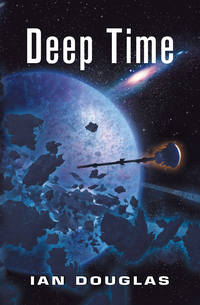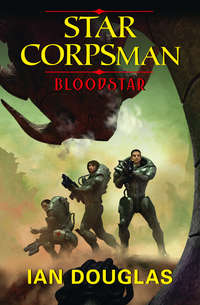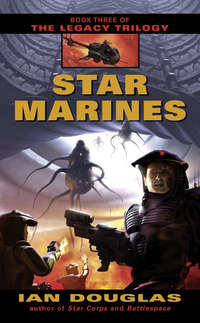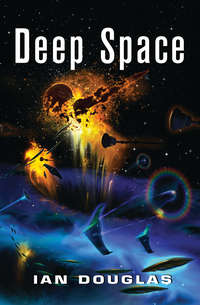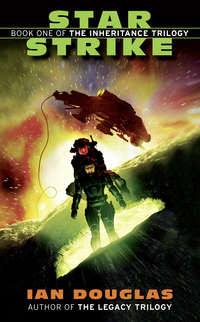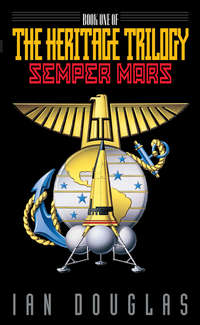
Полная версия
Centre of Gravity
“Hey, back off,” Lieutenant Ben Donovan said. “We’re all a bit nervous tonight.”
Gray looked down at his uniform, which was currently configured for flight utility—the plain and unadorned dark gray skinsuit worn by pilots jacked into their fighters—“jackies,” in flight-line slang. Angrily, he slapped the set-patch on his left shoulder, calling up a menu within his inner display. Mindclicking on Full Dress, Formal engaged the nanotechnic interface. With a somewhat tingling sensation, his clothing rearranged itself, tightening, unfolding, and taking on texture and color.
Confederation Navy formal full dress was a glossy black skinsuit, throat to soles, with an intricate layer of bright gold knotwork sheathing the left third of his body—arm, side, and outer leg, extending all the way from shoulder to ankle. His rank tabs glowed to either side of his throat, and a panel over his left breast displayed a fluorescent animation of awards and decorations. He’d only been in for five years, so the cycling award display was a short one: Confederation Military Service, the Battles of Everdawn and of Arcturus Station, and the newly awarded Legion of the Defense of Earth, with cluster for distinguished service.
“That looks better!” Donovan said, grinning.
“I feel like a damned adwall,” Gray replied, referring to the ubiquitous multistory display panels serving as animated or live-action advertising displays on the walls of arcologies and city buildings.
“But a squared-away, Navy adwall,” Donovan said. He slapped Gray on his gold-entwined arm. “C’mon! Let’s check out the party!”
The Grand Concourse was an immense, domed-over plaza of light, crowds, and color. At the near end, the boulevard wrapped around a depression, a terraced bowl well over two hundred meters across, with standing, sitting, and reclining room for some thousands of people at once. A touch and a thought could grow a chair from the floor, soften to a sunken lounger, or extrude tables complete with a seemingly endless variety of food and drink. Everywhere there was light; the Yule celebrations marked the holy seasons of at least three major religious groups, all of them festivals of light, and the air was filled with twisting, cascading, and shimmering veils of liquid radiance and starbow hues.
“Best behaviors, Dragonfires,” Allyn’s voice whispered in their heads. “Corders, secmons, and deets on at all times, and we will know if you switch them off.”
Several of the pilots nearby grumbled at that. Corders were recording sensors grown within the weave of military uniforms. If anyone got into trouble tonight, there’d be a full audiovisual record of the incident for the court-martial afterward. Secmons were security monitors, non-AI software routines designed to warn personnel about possible security breaches. Deets were detoxifiers. There were quite a few sense-altering drugs, scents, and beverages on display, but the micrometabolic processors nano-grown within each pilot’s brain would sample chemicals in the bloodstream, monitor sensory input, and harmlessly filter out the offending chemical before he or she developed more than a light buzz.
For the Navy, professionalism and decorum were the watchwords. Always.
As Gray descended into the crowded concourse bowl, he felt momentarily disoriented. Walls were grown as easily as chairs or appetizers, and could be called into being to create small and cozy alcoves or private spaces, creating a labyrinthine effect, and as walls and rooms came and went, it became difficult to navigate. Some walls appeared to be solid, carved stone; others were screens apparently of wickerwork or painted panels, or of woven vines or other vegetation. The air seemed to grow hazier, the deeper into the bowl he traveled. At the moment, the air glowed with a deep red light, though an ultraviolet component was making the black of his uniform fluoresce with a deep, electric shimmer of ultramarine. Overhead, constellations of lights gleamed brightly, mostly in red and green, for some reason.
There seemed to be no particular theme, save that of people.
The crowd within that one hall must have numbered five thousand—roughly the same as the crew on board America. He saw a few other military uniforms, most of them the richly patterned black and gold of senior naval officers, or the ancient red, white, and blue of Marine full dress. They stood out within the far, far larger number of civilians, who wore a bewildering array of costumes, from brilliant, swirling plumage, much of it glowing under the UV light, to swirling patterns of iridescent skin nano to complete nudity.
The men seemed to be more conservatively dressed, he noticed—formal skinsuits or robes, though there were a few bright-colored ones aglow in light or with pulsing animations writhing about their bodies. The women, though, all were spectacular in their multihued displays. One strikingly attractive woman in front of him was wearing a startling, meter-high headdress that appeared to be a spray of suspended fiber-optic threads, the light shimmering in a halo effect around her—and nothing else. She saw him looking at her, raised her glass in a mock toast, and winked.
The woman she was talking with appeared to be wearing nothing but white light, as though her skin has become brilliantly luminous, with stars set in her hair and hovering about her head.
“Someone is pinging you,” his personal assistant told him.
“Who?”
“I’m sorry. Her id is blocked.”
“‘Her’? A woman? Where is she?”
An inner tug gave him a direction. That way. “Range: eighty-seven meters,” his PA said.
Odd. Personal ids—the term was pronounced as a word, rhyming with “lid”—were normally open to all within the electronic world of personal assistants and implanted communications and information hardware. The ping might mean she was interested in him, or it might mean she was just curious, tagging his personal information. That she was not revealing her own personal data, though, meant she wanted to remain anonymous, at least for now.
Who would be looking for him here? If it was Allyn or another shipmate, their military ids would have registered with his PA immediately, a kind of personal IFF. A civilian, then … but he didn’t know anyone at this gathering.
Nor, really, did he care to. The only time in his life when he’d actually sought out civilians in the civilized parts of New York had been when he’d taken Angela to the Columbia Arcology in a desperate attempt to save her when she’d had a stroke. The inhabitants of the Periphery—the fallen-away outer fringes of the old United States, which included the Manhat Ruins—weren’t considered to be full citizens, and normally they didn’t have access to modern medical services. All but the most severe cardiovascular emergencies were easily treated in a modern medical center like the one in Columbia; in a Prim community in the Periphery, a stroke could kill you or leave you helplessly paralyzed.
He’d gotten Angela to the med center while she was still alive … and they’d repaired her. The cost, however, had been him, a ten-year term with the Confederation military.
Of course, the treatment had also cost him Angela. They’d done something to her brain while saving her … something that had shut down her affection for him. Or, maybe that had been an effect of the stroke. That’s what they’d told him, anyway, that that sort of thing often happened when old neural pathways were burned out, new paths channeled in. Whichever it had been, his once-wife had chosen to leave him rather than going back to the canals and vine-covered islands of the Ruins.
Hell, he couldn’t even blame her for that. She’d downloaded the skill sets allowing her to become a compositor, a career classification completely unknown to him. She’d moved north to New New York City’s Haworth District, he’d heard, and was living with an extended family there.
At least she hadn’t been in Columbia when the impactor wave had brought the arcology tower down. Or at least, so he hoped. He hadn’t heard from her since he’d left for the Naval Training Center five years earlier. He’d been told she’d moved to Haworth and that she didn’t want to see him … but he didn’t know.
“Shall I reply?” his PA asked.
“Negative,” he said. He couldn’t imagine this crowd having anything pleasant to say to him.
He’d tried to get out of coming tonight. Lieutenant Commander Allyn had told him yesterday, in the squadron ready room on board America, that he’d been volunteered for the fly-by show, with attendance at the Yule Festival afterward.
“Why me?” he’d asked. “I’ve got nothing to do with Earthies anymore.”
“Oh, I don’t know,” the Dragonfires’ skipper had replied. “Maybe because you had something to do with saving all of their asses?”
That again. “Fuck that, sir,” he said, using the Navy’s preferred gender-neutral honorific, though ma’am would have done as well. “I was doing my job.”
“And maybe your job includes being a visible symbol of the Confederation Navy,” she’d told him. “Don’t give me grief, Gray. You’re on the flight roster, like it or not.”
And here he was.
In a nearby temporary alcove, Donovan was holding a young woman very closely indeed. She was wearing a sheath of golden, rippling light, and appeared to have extended the field to include Ben in her embrace. Gray looked away, embarrassed, and found himself looking into another alcove, this one with two men and a woman on a round sofa bed, engaged in some extremely passionate foreplay.
Angry, he turned his head again and strode forward, determined to find something to eat. He felt so damned out of place here. …
Within the Periphery, the necessities of survival tended to draw people into close, monogamous couples. Elsewhere, at least through much of North America, family groupings tended to be larger and extended, polyamorous, and impermanent. Throughout much of the background culture of the Confederation, the half-barbaric denizens of the Periphery were seen as amusingly quaint, or worse: as narrow-minded or even sexually perverted. They were commonly called “Prims,” which was short for “primitives,” of course, but the epithet held the double meaning of someone who was self-righteously prudish or closed sexually. “Monogies” was another derogative term for Prims who preferred a monogamous lifestyle; why would anyone want to restrict their life and their love to a single person?
Gray was neither prudish nor self-righteous. He knew other communities did things differently when it came to sex and marriage, and had no problem with the fact. Extended social group marriages and sexcircles simply weren’t for him. The thought of casually coupling with a woman he didn’t know—and couldn’t trust—left him vaguely uneasy.
A table extruded from the floor beneath an enormous transparency overlooking the Hudson was covered by dishes of various kinds, all of them pretty, few of them things he actually recognized. America had a decent mess deck and good food-processing software, but nothing as fancy as this. Some of the items actually looked as though they’d started out as vegetation growing in the ground or an aerophonics module rather than a collection of CHON turned appetizing by a molecular assembler.
He tried something green and crunchy with an orange paste spread across the top. Interesting …
“You are being pinged again by the same person,” his PA told him. His internal direction sense said, That way, toward an outside veranda. “Range: thirty-one meters and approaching.”
“Let her,” Gray said.
He kept eating.
H’rulka Warship 434
Saturn Space, Sol System
1242 hours, TFT
The H’rulka didn’t name their starships. A name suggested an individual personality, and the concept of the individual was one only barely grasped by H’rulka psychology. The H’rulka were, in fact, colony organisms; a very rough terrestrial analogue would have been the Portuguese Man of War … though the H’rulka were not marine creatures, and each was composed of several hundred types of communal polyps, rather than just four. Even their name for themselves—which came across in a hydrogen atmosphere as a shrill, high-pitched thunder generated by gas bags beneath the primary flotation sac—meant something like “All of Us,” and could refer either to a single colony, in the first person, or to the race as a whole.
Individual H’rulka colonies took on temporary names, however, as dictated by their responsibilities within the community. Ordered Ascent was the commander of Warship 434, itself until recently a part of a larger vessel, Warship 432. The species didn’t have a government as humans would have understood the term, and even the captain of a starship was more of a principal decision maker than a leader.
Ordered Ascent was linked in with 434’s external sensors, and was studying the planet just ahead. The alien solar system comprised a single star and four planets, plus the usual scattering of rubble and debris. The planet some eighty thousand shu ahead was almost achingly familiar in size and mass and gently banded color, a near twin to the homeworld so many shishu away, right down to the sweeping rings of minute, reflective particles circling it.
“It looks like home,” the aggregate being called Swift Pouncer whispered over the private radio link. H’rulka possessed two entirely separate means of speech, two separate languages—one by means of vibrations in the atmosphere, the other by means of biologically generated radio bursts. Their natural radio transceivers, located just beneath the doughnut-shaped cluster of polyps forming their brains, allowed them to interface directly with their machines.
“Similar,” Ordered Ascent replied. “It appears to be inhabited.”
“We are receiving speech from one of the debris-chunks orbiting the world,” Swift Pouncer replied. “It may be a vermin-nest. And … we are receiving speech from numerous sources much closer to the local star.”
Ordered Ascent tuned in to the broadband scanners and saw the other signals.
Those members of Ordered Ascent capable of rational thought chided themselves. No matter how long they served within the far-flung fleets of the Sh’daar, it was difficult to remember that vermin-nests frequently occurred, not within the atmospheres of true planets, but on the inhospitable solid surfaces of debris.
It was an unsettling thought. For just a moment, Ordered Ascent allowed themselves to pull back from the instrumentation feeds, to find steadiness and reassurance in the sight of the Collective Globe.
The interior of the H’rulka warship was immense by human standards, but cramped to the point of stark claustrophobia for the species called All of Us. The area that served as the equivalent of the bridge on a human starship was well over two kilometers across, a vast spherical space filled by twelve free-floating H’rulka colonies in a dodecahedral array. Connected by radio to their ship, they used radio commands to direct and maneuver the huge vessel, fire the weapons, and observe their surroundings.
They lived in the high-pressure atmosphere of gas giants, breathing hydrogen and metabolizing methane, ammonia, and drifting organic tidbits analogous to the plankton of Terran oceans. Until one of the Sh’daar’s client species had shown them how to use solid materials to build spacecraft that defied both gravity and hard vacuum, they’d never known the interior of anything, never known what it was like to be enclosed, to be trapped inside. The interior of Warship 434 was large enough—just—to avoid triggering a serious claustrophobic-panic reflex in All of Us aggregates. Sometimes, they needed to see other aggregates adrift in the sky simply in order to feel safe.
Feeling steadier, Ordered Ascent relinked with the ship and their fellow H’rulka. “Can we be sure that this is the system to which the alien probe fled?” they asked.
“Yes, with a probability of eighty-six percent plus,” one of the others replied. “The shard that we followed almost certainly came here.”
Warship 432 had pursued the probe that had passed through System 783,451. The probe abruptly had split onto four pieces, four shards each independently powered, each traveling in a different direction.
The H’rulka ship had split into four sections as well in response. Warship 434 had followed one fragment, a difficult feat in the weirdly distorted continuum of faster-than-light travel, but possible given the power of certain Sh’daar instrumentation. The selected shard had dropped out of faster-than-light drive after some periods of travel, changed heading, and accelerated once more. The new path had brought it, and the pursuing All of Us, here.
“The system is known to the Sh’daar,” Pouncer reported. “They list it as System 784,857.”
Data streamed down the radio link through Directed Ascent’s consciousness. The inhabitants of this system were indeed native to the system debris.
Vermin …
The All of Us race was unaccustomed to dealing with other sentient species. One of the primary reasons for this was, simply, their size; by almost any standards, the H’rulka were giants.
An adult H’rulka consisted of a floatation gas bag measuring anywhere from two to three hundred meters across, with brain, locomotion and feeding organs, sensory apparatus and manipulators clustered at the bottom. Most other sentient species with which they’d had direct experience possessed roughly the same size and mass ratio to a H’rulka as an ant compared to a human.
When the H’rulka thought of other life forms as “vermin,” the thought was less insult than it was a statement of fact, at least as they perceived it. Within the complex biosphere of the H’rulka homeworld, there were parasites living on each All of Us colony that were some meters across. H’rulka simply found it difficult to imagine creatures as intelligent that were almost literally beneath their notice in terms of scale.
“Commence acceleration,” Ordered Ascent directed. “We will move into the region of heavy radio transmission, and destroy targets of opportunity as they present themselves.”
The H’rulka warship, more than twenty kilometers across, began falling toward Sol, the inner system, and Earth.
Palisades Eudaimonium
New York State, Earth
1750 hours, EST
Admiral Koenig looked out over the sea of people filling the Grand Concourse of the eudaimonium and wondered, again, just what he was supposed to be doing here.
He’d been the center of attention for a number of politicians and Confederation military leaders ever since arriving here an hour before, but there seemed to be no particular point to it, other than allowing wealthy or important civilians to get a sense of their own importance by being close to the Man Who Saved Earth.
What unmitigated bullshit.
He was standing on a railed platform high above the bowl-shaped main floor filling much of the Grand Concourse, along with a number of senators and high-ranking military officers, members of the Confederation Senate and of the Joint Chiefs of Staff.
John Quintanilla, a senior political liaison between the Senate and the military, stood next to him. “Well, Admiral?” Quintanilla asked. “Are you ready?”
“No,” Koenig told him. “But I don’t suppose that’s going to change things, is it?”
Quintanilla grinned. “Not in the least!”
The man seemed … animated. Koenig rarely got to see this side of Quintanilla. Usually, the liaison was, if not an enemy, exactly, at least in the way … obstructionistic, fussy, and difficult. Political liaisons were a necessity, Koenig supposed, a means for the civilian government to exercise their control over a potentially dangerous military, but he didn’t like it. For member-states of the Confederation with long traditions of having a military subject to government oversight—in particular the United States of North America—that tradition and a sense of duty alone was enough to guarantee the military’s loyalty to the government. Other members of the Confederation, though—the European Union, los Estados de las Americas del Sur, the Empire of Brazil, the North India Federation, and many of the extrasolar colonies—had long histories of having their militaries dictating in one way or another to their governments, hence the need for direct oversight of military operations.
Koenig had thrown Quintanilla off of his flag bridge once, an act that could have inflicted serious harm on Koenig’s career. Success, however, covered a multitude of sins. The incident had been quietly smoothed over and forgotten.
“The president’s about to start his speech,” Quintanilla told him. “You stand … here.” Quintanilla guided Koenig to a holographic transmission disk set into the floor. The disk was inactive, its light off.
“Ladies and gentlemen,” a voice boomed from somewhere overhead. “The President of the Confederation Senate!”
Accompanied by the powerful, martial beat of Ad Astra, the Confederation’s anthem, a glowing figure materialized in the air above the crowded bowl, an older man in a stylish formal robe, ten stories tall and eerily translucent.
“We are here,” the looming figure boomed in somber tones and without preamble, “to honor the Man Who Saved Earth. …”
The president’s speech went on for a long time.
Under the terms of the original Constitution of the United States, government had been divided three ways between a two-house legislative congress, a president, and a supreme court, each applying checks and balances against the others in order, it was hoped, to limit government and avoid tyranny. That system, ultimately, had failed with a succession of weak presidents and corrupt legislators. The devastation wreaked by the Wormwood asteroid strike 272 years before had shattered much of the old United States and very nearly ended the fragile experiment in democracy begun in 1776.
The Earth Confederation had been an attempt to create a single-world government and end the possibility that any single nation-state would ever again threaten another nation—or the entire human species—with extinction. The attempt had been only partly successful. The Chinese Hegemony, which had launched the asteroid strike in the first place, back at the end of the Second Sino-Western War, was still not a full member, and the Islamic Theocracy was barely tolerated, permitted to exist only under the terms of the earlier White Covenant at gunpoint.
The system creaked and tottered. There were no checks and balances now, and corruption was as much of a problem as it had ever been. A Confederation Senate oversaw both the legislative and executive processes of government, with numerous directorates handling individual areas of interest—lawmaking, the military, the economy, and others. The president of the Senate was largely a figurehead, elected by the Senate body once every ten years.
The current president of the Confederation Senate, now towering above the crowds filling the eudaimonium’s Grand Concourse, was a former representative of the European Union named Dolph Schneider.
“… for it is in times like these, times of crisis, that History herself steps forward and presents us with the man or the woman of the hour, the person who can and will confront the crisis and unite the people in their struggle against …”
Koenig listened with only half an ear, more aware of the inflection and meter of the speech than of the words themselves. He cared nothing for politics, and dismissed most political speeches as hand waving designed to justify decisions already made. But the outward form of democracy, of political debate and accountability, had to be preserved.
“… and it gives me great pleasure, great satisfaction, to introduce Rear Admiral Alexander Koenig, the Man Who Saved Earth!”
The disk beneath Koenig’s boots winked on, and the immense figure of the president hovering above the Concourse was replaced by his own.


